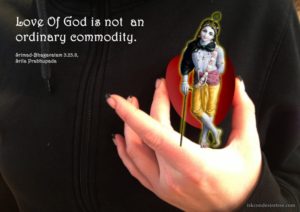Hare Krishna dear devotees,
So many times we hear the word ‘bhava’ among devotees that one should develop bhava for Krishna or so and so devotee has a very nice bhava. So what actually is this bhava? Is it emotions, is it feelings, is it love or is it a mixture of many things. Sometimes we use this term very casually or liberally in the devotee circles. Indeed, bhava, being the preliminary stage of elevation before the attainment of pure love of Krishna, is a very deep topic. It is meant to be discussed by paramahamsas or liberated devotees. However keeping the lotus feet of Srila Prabhupada in our consciousness we can pray and try to taste a small drop from the unlimited ocean of nectar of devotion.
What is bhava ?
The state of being in love with the Godhead is compared to the sunshine emanating from the sun; this shining makes the devotee’s heart more and more lovely. The heart of such a devotee is situated in a transcendental position beyond even the mode of goodness. The process for making the heart even more sterilized by the sunshine of love is called bhäva.
(TLC , chapter 13)
How can I attain the state of Bhava ?
The transcendental ecstatic attachment for Kåñëa which results from perfectly understanding that Kåñëa’s person and name are identical is called bhäva. One who has attained bhäva is certainly not contaminated by material nature. He actually enjoys transcendental pleasure from bhäva, and when bhäva is intensified, it is called love of Godhead. Lord Caitanya told Prakäçänanda Sarasvaté that the holy name of Kåñëa, called the mahä-mantra (great chanting), enables anyone who chants it to attain the stage of love of Godhead, or intensified bhäva.
(TLC, chapter 19)
It all begins from hearing about Krishna and brings about Love for Krishna!
Generally we experience that people are primarily interested in seeing Kåñëa, but why is the emphasis on seeing? Let us hear about Him. We must come with a little faith, and as we hear, that faith will increase. One should come to the temple, listen to talks about Kåñëa, and then, after some time, officially take initiation into the service of the Lord. That is called bhajana-kriyä. At that time one has to abandon illicit sex, intoxication, meat-eating and gambling. If one is still attached to all these habits, he should know that he is not making progress. When one is actually advanced in bhajana-kriyä, all these anarthas (unwanted things) will be finished. paraà dåñövä nivartate [BG. 2.59]. When one appreciates something better, he rejects all kinds of nonsense. Once one gets a taste of Kåñëa consciousness, he cannot remain without it. A drunkard cannot remain without a drink, but a devotee is drunk with Kåñëa consciousness. The immunization against all material diseases is this Kåñëa consciousness. To be immuned to the infection of the guëas, we have to engage in bhakti-yoga. Once we attain the perfectional stage, we attain ecstatic love of Godhead. In that state we cannot remain without Kåñëa for a moment. That is called bhäva, and that bhäva may increase to mahä-bhäva. This is not possible for ordinary human beings, but it was possible for the gopés and Rädhäräëé. Indeed, they could not live without Kåñëa. This is the highest stage of liberation.
(TLK, chapter 8)
I want to hear more!
There are two characteristics by which the seeds of love of Godhead can develop, and these are known as rati, or attachment, and bhäva, the condition immediately preceding love of Godhead. It is by such attachment and bhäva that the Supreme Lord Çré Kåñëa is conquered by His devotees. These two characteristics are present before any symptoms of love of Godhead are manifest. This was all explained to Sanätana Gosvämé by Lord Caitanya. Lord Caitanya told him that since there is really no end to describing the system of devotional service with attachment, He is simply trying to offer a sampling. Lord Caitanya then described the ultimate goal of devotional service, which is meant for one who wants to attain perfection. When one’s attachment to Kåñëa becomes very deep, one attains the condition called love of Godhead. Such a state of existence is considered a permanent situation for a devotee.
In Bhakti-rasämåta-sindhu (1.3.1) the state of being in love with the Godhead is compared to the sunshine emanating from the sun; this shining makes the devotee’s heart more and more lovely. The heart of such a devotee is situated in a transcendental position beyond even the mode of goodness. The process for making the heart even more sterilized by the sunshine of love is called bhäva. A description of bhäva is given by Rüpa Gosvämé. Bhäva is called the permanent characteristic of the living entity, and the crucial point of progress for bhäva is called the marginal state of love of Godhead. When the bhäva state becomes deeper and deeper, learned devotees call it love of Godhead. As stated in the Närada-païcarätra:
ananya-mamatä viñëau mamatä prema-saìgatä
bhaktir ity ucyate bhéñma-prahlädoddhava-näradaiù
“When one is firmly convinced that Viñëu is the only object of love and worship and that there is no one else—not even a demigod—worthy of receiving devotional service, one feels intimacy in his love relationship with God, and this is approved by such personalities as Bhéñma, Prahläda, Uddhava and Närada.”
If, due to some righteous activities which provoke devotional service, one is influenced by the service attitude and takes shelter of the good association of pure devotees, he develops attachment for hearing and chanting. By developing chanting and hearing, one can advance further and further in regulative devotional service to the Supreme Lord. As one so advances, his misgivings about devotional service and his attraction for the material world proportionately diminish. By advancing in hearing and chanting, a devotee becomes more firmly fixed in his faith, and gradually his initial faith develops into a taste for devotional service, and that taste gradually develops into attachment. When attachment becomes pure, it exhibits the two characteristics of bhäva and rati. When rati increases, it is called love of Godhead, and love of Godhead is the ultimate goal of human life.
This process is summarized by Rüpa Gosvämé in Bhakti-rasämåta-sindhu (1.4.15-16): The first requirement is faith; it is due to faith that one associates with pure devotees, and, by such association, develops devotional service. As devotional service develops, one’s misgivings diminish. Then one is situated in firm conviction, and from that conviction he develops a taste for devotional service and advances to the stage of attachment, whereby he follows the regulative principles of devotional service. After that point, after one makes further progress, he attains the state called bhäva, which is permanent. When such love of God increases, it reaches the highest stage of love of Godhead.”
In Sanskrit this highest stage is called premä, premä can be defined as love of God without any expectation of exchange or return. Actually the words premä and love are not synonymous, yet one can say that premä is the highest stage of love. One who has attained premä is the most perfect human being. Çrémad-Bhägavatam also confirms this statement (SB 3.25.25): Only by the association of pure devotees can one develop a taste for Kåñëa consciousness, and when he tries to apply Kåñëa consciousness in his life, he can achieve everything up to the stage of bhäva and prema.
In order to save us from getting cheated or fooled, scriptures share the external symptoms (as we do not have direct access to the heart of other person) of such a pure devotee who has reached the stage of Bhava ( whose association one must aspire and pray for)
Lord Caitanya, describing the symptoms of a person who has developed from faith to the stage of bhäva, states that such a person is never agitated even if there are causes for agitation. Nor does such a person waste his time even for a moment; he is always anxious to do something for Kåñëa. Even if he has no engagement, he will find some work to do for Kåñëa’s satisfaction. Nor does such a person like anything which is not connected with Kåñëa. Although he is situated in the best position, he does not hanker after honor or personal respect. He is confident in his work, and he is never under the impression that he is not making progress toward the supreme goal of life-going back to Godhead. Since he is fully convinced of his progress, he is always confident and keeps himself busy to achieve the highest goal. He is very much attached to gratifying the Lord and in chanting or hearing about the Lord, and he is always attached to describing the transcendental qualities of the Lord. He also prefers to live in holy places like Mathurä, Våndävana or Dvärakä. Such characteristics are visible in one who has developed to the stage of bhäva.
(TLC , chapter 13)
An Example
King Parékñit affords a good example of bhäva. When sitting on the banks of the Ganges waiting to meet his death, he said: “All the brähmaëas present here, as well as Mother Ganges, should know that I am a soul completely surrendered to Kåñëa. I do not mind if I am immediately bitten by the snake sent by the brähmaëa boy’s curse. Let the snake bite me as it likes. I shall be pleased if all of you present here will go on chanting the message of Kåñëa.” Such a devotee is always anxious to see that his time is not wasted in anything which is not connected with Kåñëa. Consequently he does not like the benefits derived from fruitive activity, yogic meditation or the cultivation of knowledge. His attachment is to discourses which are favorably related to Kåñëa. Such pure devotees of the Lord always pray to the Supreme Lord with tears in their eyes; their minds are always engaged in recollecting the activities of the Lord, and their bodies are always engaged in offering obeisances. In this way they are satisfied. Any devotee who is acting in devotional service dedicates his life and body for the purpose of the Lord.
(TLC , chapter 13)
All glories to Sri Guru and Gauranga.
All glories to Srila Prabhupada.
Your servant,
Giriraj dasa



